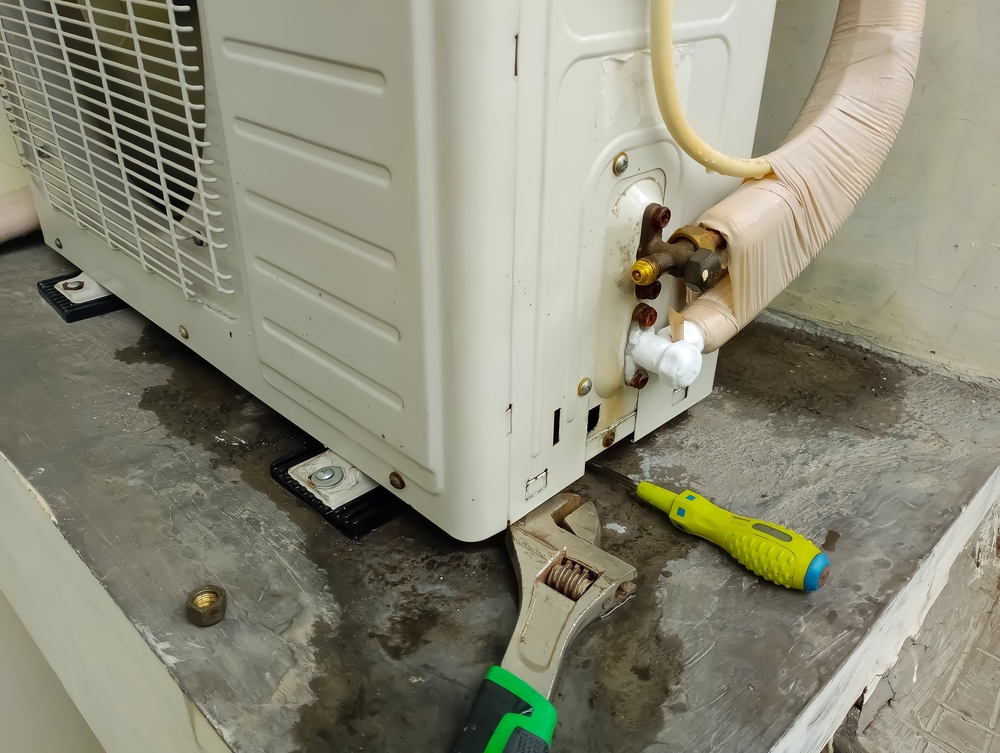An AC drip pan, also known as a condensate pan, is a critical component of your air conditioning system. Its primary function is to catch the water that condenses on the evaporator coil as the air conditioner cools the air. The pan directs this moisture to a drain line, preventing water damage and ensuring the system operates efficiently. When the water in the AC drip pan fills up, it can signal potential issues within your HVAC system.

Identifying the Issue
You may notice AC drain pan overflowing through several signs:
- Water Pooling: Visible water pooling around the drip pan or noticeable wet spots on the floor near the air handler
- Water Stains: Stains or rust marks on or around the drip pan
- Musty Odors: Unpleasant, musty smells emanating from the unit, which can indicate water buildup and potential mold growth
- System Shut-Off: Some systems have safety switches that will turn off the AC unit if the drip pan overflows to prevent further damage
Causes of a Full AC Drip Pan
Several common issues can lead to AC pan water issues:
- Clogged Drain Lines: The drain line carries condensate away from the pan. Over time, it can become clogged with algae, dirt, or debris. When this happens, the water has nowhere to go and accumulates in the drip pan.
- Dirty Air Filters: Air filters trap dust and debris, but when they become too dirty, they restrict airflow over the evaporator coil. This can cause the coil to freeze and, when it thaws, result in excessive water that the pan cannot handle.
- Broken Condensate Pump: In systems where a condensate pump is used, a malfunction or breakdown can prevent water from being pumped out of the pan, leading to overflow.
- Improper Installation: If the drip pan or drain lines are not installed correctly, it can lead to drainage issues. For example, an improperly pitched drain line may not allow water to flow away effectively.
- High Humidity Levels: In regions like Orlando with high humidity, the increased volume of condensate can overwhelm the drip pan if the system isn’t adequately sized or maintained.
How to Fix the AC Drip Pan Overflow Problem
Here is a step-by-step guide to address the air conditioner drain pan water issue:
- Turn Off the Power: Before performing any maintenance, switch off the power to your air conditioning unit to ensure safety.
- Empty the Pan: Carefully remove the water from the drip pan using a sponge, towel, or small pump. Be cautious not to spill water, which could cause damage.
- Check for Clogs: Inspect the drain line for any visible clogs. Use a plumber’s snake or a wet-dry vacuum to clear the line if necessary.
- Clean the Air Filter: Replace or clean the air filter to ensure proper airflow over the evaporator coil. This can help prevent future freeze-ups and excessive water accumulation.
- Inspect the Condensate Pump: If your system uses a condensate pump, check it for proper operation. Clean or replace the pump if it is not functioning correctly.
- Verify Proper Installation: Ensure that the drip pan and drain lines are properly installed and aligned. Adjust or re-install components as needed.
Preventive Measures
To prevent your AC drip pan from filling up with water in the future, consider the following tips:
- Regular Maintenance: Schedule regular AC maintenance in Orlando, including cleaning and inspecting the drip pan, drain lines, and air filters.
- Timely Inspections: Have a professional inspect your system annually to catch any issues before they become significant problems.
- Keep the Area Clean: Ensure the area around your AC unit is free of debris and obstructions that could affect drainage.
- Install a Float Switch: Consider installing a float switch that will shut off the system if the drip pan fills beyond a certain level. This can prevent water damage and system shutdowns.
When to Call Our Orlando HVAC Professionals at Downtown Air and Heat
While some issues can be resolved with DIY steps, there are situations where professional assistance from a proven Orlando air conditioning company like Downtown Air and Heat is essential.
Persistent Overflow
If you find that your AC drip pan continues to overflow despite your best efforts to fix it, this could signal a deeper problem within your system. At Downtown Air and Heat, our experienced technicians will conduct a comprehensive inspection to identify the root cause of the persistent overflow.
This could involve checking the entire condensate drainage system for blockages, leaks, or faulty components. We will thoroughly assess the drain lines, the integrity of the drip pan, and any related parts to determine the underlying issue.
Complex Repairs
When issues arise with components such as the condensate pump or drain line, or if there are concerns about improper system installation, our AC repair Orlando professionals are equipped to handle complex repairs. We use advanced diagnostic tools and techniques to assess the condition of these critical components.
If the condensate pump is malfunctioning, we will check for electrical issues or mechanical failures and replace the pump if necessary. For drain line problems, we will inspect for clogs, leaks, or damage and perform repairs or replacements as needed.
System Malfunctions
If your HVAC system is producing unusual sounds or odors or showing signs of poor performance, it’s essential to seek professional help. Our technicians at Downtown Air and Heat will perform a detailed evaluation to diagnose any system malfunctions. We will listen for unusual noises, detect any strange smells, and assess the system’s overall performance.
With the use of advanced diagnostic equipment, we can identify issues that might not be visible to the untrained eye. Our approach ensures that any underlying problems are addressed promptly, preventing further damage and extending the life of your HVAC system.
For 24-hour emergency service, call us at 407-408-7105 or schedule a service online.








